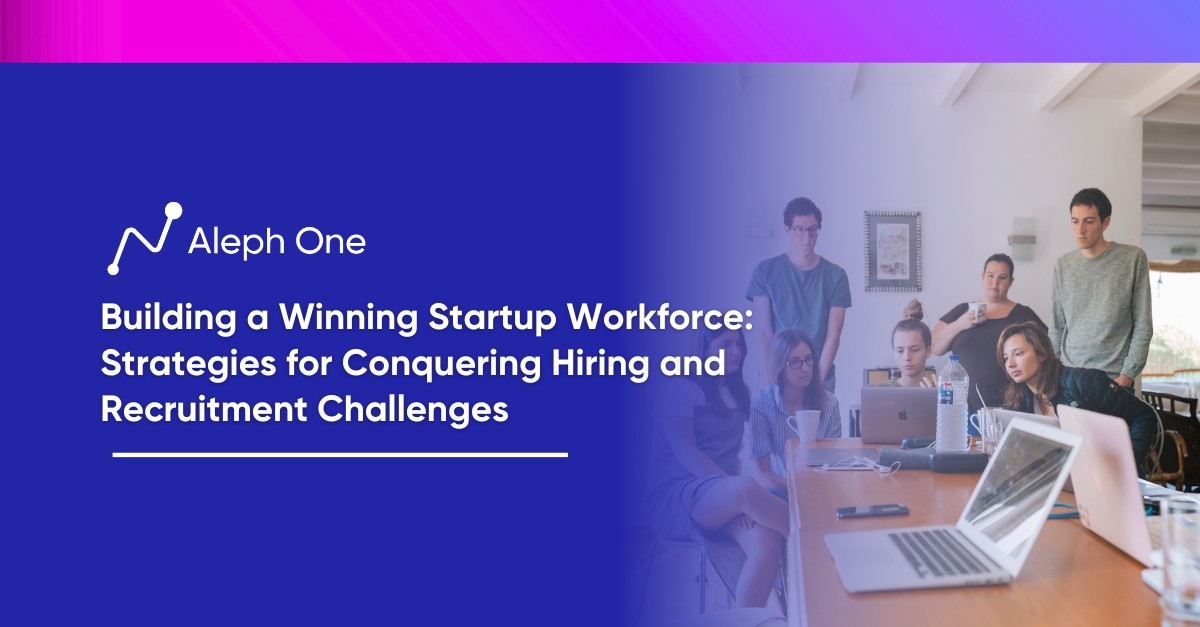Let’s work together to build something amazing. Share your project details and our team will reply to figure out the next steps to your success.

The success of a startup depends on attracting and retaining top talent. This article will explore strategies for conquering hiring and recruitment challenges. We will discuss how startups can build a compelling employer brand, tap into employee networks, recruit passive candidates, and get creative with compensation and benefits. With the right approach, startups can build a winning team and succeed.

The War for Talent: How Startups Can Win the Battle
Startups often need more resources and brand recognition to attract top talent. To win the battle for talent, startups must build a compelling employer brand, tap into employee networks, and recruit passive candidates.
Recruiting Top Talent
Employee Referrals
A LinkedIn survey shows employee referrals result in the highest quality hires. Startups should focus on cultivating an employee referral program by offering incentives for referrals that turn into hires. Employees can tap into their networks to find candidates with a great culture and skills fit.
Building a Strong Employer Brand
Creating a strong employer brand can also help startups compete with larger companies. A compelling brand highlights the startup’s mission, culture, and values. Candidates are more likely to want to work with a company with similar values, so getting that information out there is essential. Startups can leverage social media, their website careers page, and review sites like Glassdoor to promote their brand. Sponsoring local events, partnering with universities, and building relationships with influencers in the industry are other ways to raise brand awareness and reach more candidates.
Recruiting Passive Candidates
Recruiting passive candidates, not active job hunting, is critical. Platforms like LinkedIn make it easy for companies to connect with these candidates by engaging with their updates, sending personalized invitations, and reaching out to express interest in their background. Passive candidates may wait to change jobs, but building a relationship over time can lead to them raising their hands when they are on the market. They could also refer other strong candidates who they think are a good fit for open roles.
With limited resources, startups must be scrappy and strategic in hiring and recruitment approaches. A few ways startups can find and engage top talent despite their size and budget constraints include an employee referral program, compelling employer brand, and recruiting passive candidates. With the high costs of making a bad hire, taking the time to implement smart recruiting strategies is worth the investment for startups looking to build a winning workforce.
Rethinking Compensation: How to Get Creative with Limited Funds
Startups typically cannot match large, established companies’ generous salaries and benefits. However, they can get creative with their compensation strategies to attract and retain top talent. Offering equity in the company, performance-based bonuses, flexible work schedules, and other benefits are all options for startups with limited funding.
Providing Equity or Stock Options
Providing employees equity or stock options in the startup is a great way to motivate them to help the company succeed. When the company does well, the value of their shares also rises. Many startups now offer equity along with a lower base salary.
Bonuses and Profit Sharing
Bonuses and profit-sharing are other ways for startups to reward employees beyond just a salary. Bonuses can be tied to individual, team, or company performance. They give employees a stake in the success of the business. A few startups now offer unlimited vacation or paid time off, expecting employees to be responsible for their time. This benefit signals trust in employees and promotes work-life balance.
Flexible Work Schedules and Other Perks
In addition to compensation, startups should consider offering other benefits like flexible work schedules, remote work options, gym memberships or wellness programs, opportunities for professional development, and a casual, collaborative work environment. Many startups today allow remote work and flexible schedules. These benefits appeal to candidates and help startups compete with more established companies.
With some creativity, startups can develop competitive compensation and benefits packages to attract top talent on a budget. By providing employees equity, performance-based bonuses, generous time off, professional development opportunities, and a progressive company culture, startups can get an edge over larger companies for talent.
Optimizing the Candidate Experience: How to Impress Talent on a Budget
The hiring process is the first interaction of candidates with your startup, so making an excellent first impression is essential. However, with limited resources, startups often need help to provide an exceptional experience for applicants. The good news is there are several low-cost ways to optimize the candidate experience.
4 Ways to Optimize the Candidate Experience
1. Craft a compelling job listing
Ensure your job listing outlines the role, responsibilities, and required qualifications. Be transparent about the job and challenges of working at an early-stage company. This helps set the right expectations and attract candidates that will thrive in a startup environment.
2. Keep candidates updated
Show that you respect candidates’ time and effort by keeping them updated on the status of their applications and scheduling interviews in a timely manner. According to a recent report, approximately 80% of job seekers say continuous updates would significantly improve their overall experience. Send a quick email to let candidates know their application was received and when they can expect to hear from you regarding an interview.
3. Conduct high-quality interviews
Make the interview process about more than just getting to know the candidates. Give them a realistic preview of the role. Come prepared with customized questions that evaluate both skills and culture fit. Explain the details of the position and company goals to help candidates determine if the startup journey is right for them. Promote transparency and have multiple team members interview top candidates.
4. Provide constructive feedback
Regardless of whether an offer is extended, provide candidates with constructive feedback. Let them know why they were or were not selected for the role and ways they can improve for future opportunities. Candidates greatly appreciate this feedback, which helps build goodwill for your brand. You never know when you may be connected again in the future.
Optimizing the hiring experience for candidates will help startups impress and attract top talent. In addition, it will build the company’s reputation as a desirable workplace, ideally making the recruiting process more inbound than outbound. Even with limited means, focusing on the candidate experience should be a priority for any startup looking to scale.
Tapping Into Overlooked Talent Pools: How to Diversify Your Startup
Many startups need more diversity, limiting their access to unique perspectives and life experiences that fuel innovation. However, there are several strategies startups can use to tap into overlooked talent pools and build a more diverse workforce.
Partner with Organizations That Support Underrepresented Groups
One approach is to partner with organizations supporting underrepresented tech groups, such as Women Who Code, Blacks in Technology, and Code2040. These organizations can help promote your job openings to qualified candidates from diverse backgrounds. You can also offer internships and apprenticeships specifically for new grads from underrepresented groups to provide them with opportunities to gain experience.
Ensure Your Hiring Practices Are Inclusive
Another strategy is to evaluate your hiring practices and company culture to ensure they are inclusive. This means avoiding biased language in job listings, diversifying your interview panel, and creating an inclusive environment where people from all backgrounds feel valued and respected. You should implement unconscious bias training for employees involved in hiring and make diversity and inclusion a company-wide priority.
Consider Remote Teams
Some startups have found success in building remote and distributed teams, providing access to talent worldwide. While remote work is not a solution, it can help startups tap into a more diverse global talent pool. Offering remote options also signals to candidates that you value work-life balance and flexibility.
Companies That Have Seen Success
Examples of startups that have prioritized diversity and benefited, as a result include Slack, Asana, and InVision. Slack’s CEO, Stewart Butterfield, has said that the company’s focus on diversity and inclusion has been key to its success. Asana’s company culture is built around inclusiveness, empathy, and work-life balance. InVision is an example of a startup with a partially remote workforce, with employees distributed around the globe.
Focusing on diversity and inclusion is not just a “nice to have” for startups. It is a business imperative that can provide access to exceptional talent, unique perspectives to drive innovation, and connections with diverse customer bases. With the right strategies and commitment, startups can overcome barriers to build a more diverse team.
The Remote Work Revolution: How Startups Can Access Global Talent
Offering remote work or work-from-home options is a compelling way for startups to access a global talent pool. According to a recent survey, around 65% of professionals would work remotely if given the option. Startups that embrace remote work can hire the best candidates regardless of location and benefit from a broader range of experiences and perspectives.
Find Ways for Remote Employees to Stay Engaged
However, managing a remote team does present challenges. Startups must invest in collaboration tools like Slack, Zoom, and Trello to keep remote employees engaged and connected. They must also establish clear communication expectations like response times and meeting cadences. Providing in-person interaction opportunities, such as at an annual company retreat, can help build rapport and strengthen company culture.
Implement Work-Life Balance Practices
Work-life balance is another key consideration for remote teams. Startups should avoid messaging or calling employees outside work hours and be flexible with time off requests. They can also provide perks that benefit remote employees, such as co-working space stipends or meal delivery credits. Employees will perform their best when their needs are being met.
Examples of Successful Remote Teams
A few successful startups with remote teams include InVision, a digital product design platform, and Buffer, a social media management company. InVision has a fully distributed team across several countries and provides generous paid time off, co-working space stipends, and an annual retreat. Buffer is a remote-first company offering perks like co-working space stipends, wellness programs, and language classes.
By embracing remote work, startups can build a global team of top talent and provide a work-life balance for employees. A distributed workforce can become competitive with the right tools and policies. The future of work is remote, and startups that get on board now will be poised for success.
Acing the Interview: How to Get the Right Hire on the First Try
Conducting compelling job interviews is crucial for startups to make the right hire the first time. According to Zippia, a single bad hire costs a company around $15,000. For resource-strapped startups, the impact is even greater.
Evaluate Both Skills and Culture Fit
Startups should focus on customized questions that evaluate both skills and culture fit. Questions should be tailored for each candidate based on their unique experience and background. For skills assessment, ask open-ended questions about how they would handle specific work situations or challenges. Ask questions about work values, teamwork, growth mindset, and problem-solving style for culture fit.
Be Transparent About Role Responsibilities
It’s also important to give candidates a realistic preview of the role. Be transparent about responsibilities, expectations, challenges, work hours, and work-life balance. This helps set the right expectations and attracts candidates that will thrive in that environment. Candidates that seem put off by the realities of startup life may not be the best fit.
Conduct In-Depth Reference Checks
While larger companies may do a few quick reference checks, startups should conduct in-depth reference calls. Ask open-ended questions about the candidate’s strengths, work quality, areas for improvement, eligibility for rehire, and fit with the startup culture. References from former managers and colleagues are ideal.
Implement a Multi-Stage Interview Process
Some startups develop a rigorous multi-stage interview process. Software startup Qualtrics interviews candidates over the phone and bring top candidates on-site to meet with multiple team members. This in-depth process helps ensure the best hire.
An effective interview process is key to startup success. While it requires an upfront investment of time, making the right hire the first time pays off significantly in the long run.
With Creativity, Startups Can Recruit Top Talent
In the competitive talent acquisition landscape, startups have historically struggled to attract top talent due to limited resources and a need for brand recognition. However, startups can overcome these challenges and win the war for talent. Starts can find and engage top talent by implementing smart recruitment strategies like building a strong employer brand, tapping into employee networks, and recruiting passive candidates.
Additionally, with creative compensation strategies like offering equity, bonuses, and other benefits, startups can compete with larger companies despite limited funds. With the right approach, startups can build a winning workforce that drives high growth and success.
Get the latest news and updates from Aleph One in your inbox.



